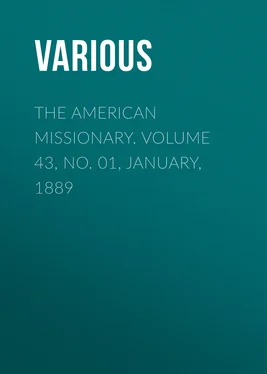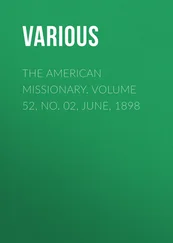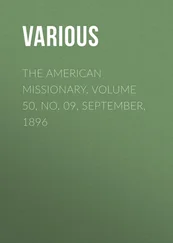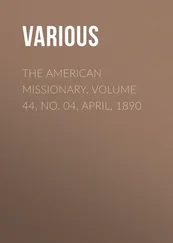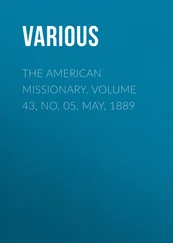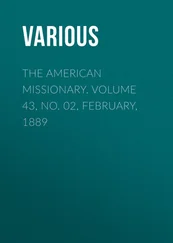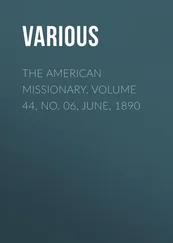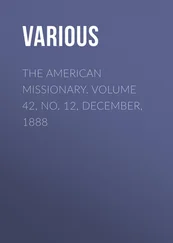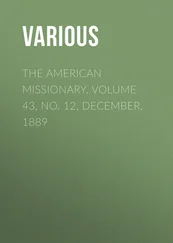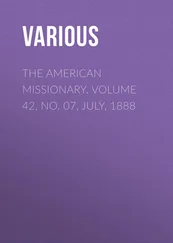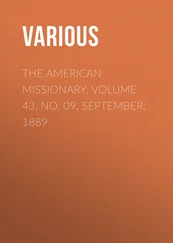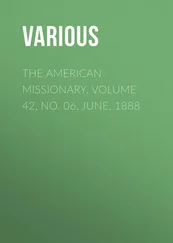Various - The American Missionary. Volume 43, No. 01, January, 1889
Здесь есть возможность читать онлайн «Various - The American Missionary. Volume 43, No. 01, January, 1889» — ознакомительный отрывок электронной книги совершенно бесплатно, а после прочтения отрывка купить полную версию. В некоторых случаях можно слушать аудио, скачать через торрент в формате fb2 и присутствует краткое содержание. Жанр: foreign_antique, periodic, foreign_edu, на английском языке. Описание произведения, (предисловие) а так же отзывы посетителей доступны на портале библиотеки ЛибКат.
- Название:The American Missionary. Volume 43, No. 01, January, 1889
- Автор:
- Жанр:
- Год:неизвестен
- ISBN:нет данных
- Рейтинг книги:4 / 5. Голосов: 1
-
Избранное:Добавить в избранное
- Отзывы:
-
Ваша оценка:
- 80
- 1
- 2
- 3
- 4
- 5
The American Missionary. Volume 43, No. 01, January, 1889: краткое содержание, описание и аннотация
Предлагаем к чтению аннотацию, описание, краткое содержание или предисловие (зависит от того, что написал сам автор книги «The American Missionary. Volume 43, No. 01, January, 1889»). Если вы не нашли необходимую информацию о книге — напишите в комментариях, мы постараемся отыскать её.
The American Missionary. Volume 43, No. 01, January, 1889 — читать онлайн ознакомительный отрывок
Ниже представлен текст книги, разбитый по страницам. Система сохранения места последней прочитанной страницы, позволяет с удобством читать онлайн бесплатно книгу «The American Missionary. Volume 43, No. 01, January, 1889», без необходимости каждый раз заново искать на чём Вы остановились. Поставьте закладку, и сможете в любой момент перейти на страницу, на которой закончили чтение.
Интервал:
Закладка:
Various
The American Missionary – Volume 43, No. 01, January, 1889
Daniel Hand
We present to our readers, on the opposite page, a picture of Mr. Daniel Hand from a photograph taken some time ago. It presents the likeness of a man of fine physical proportions and with energy and intelligence impressed on the features. The signature at the bottom of the picture is copied from one of Mr. Hand's recent letters, and shows the remarkable physical vigor of a man in his 88th year.
NEW YEAR'S GREETINGS
The New Year opens upon us auspiciously, and we send forth our joyous greetings to our patrons at home, and to our fellow workers in the field. Above all we thank God for putting us into this ministry for the poor and the ignorant, and for the success granted to us in prosecuting it. We have had sorrows and anxieties, but they have been followed by consolations and deliverances. The hand that penned the "Happy New Year" in our MISSIONARY for last January, is now silent in the grave, but the memory of Brother Powell's life and character is so precious that it mitigates our loss. The yellow fever prevented the opening of many of our schools, and awakened fears of widespread hindrance to our work throughout the South; but the scourge was restrained, and the work now goes on prosperously. Our last fiscal year drew towards its close with the cloud of a large debt looming up, but our friends responded so generously to our appeals, that the year ended with a debt so small as to be only a salutary warning.
But the crowning mercy of the year came at our Annual Meeting, when we were able to announce the gift of over a million of dollars from that generous friend of the poor Negro, Mr. Daniel Hand. It is a wonderful gift, and comes in a good way. The income only can be used, and that will do just so much more for the Negro, and will not be applied to work now in progress. We are tempted to fear that our patrons will diminish their gifts because Mr. Hand has been so liberal. But we will have faith in God, who has entrusted us with this great work, and we will enter upon our new year with the full confidence that every friend of the Association who appreciates our responsibilities to Christ and the Nation, will decide that his gifts to us shall be increased and not diminished in this year of grace 1889.
Financial
Emphasis is added to the closing words of the preceding article by the report of our Treasurer for the first two months of our fiscal year, October and November. The receipts for those two months were, from donations, $31,261.99; from estates, $3,961.29; from income, $1,822.72, making a total for current work of $37,046. The Association needs $62,500 for these two months. Let us remind our patrons that Mr. Hand's gift will do its own work and not theirs. We think they will feel that it is only honorable to let Mr. Hand's benefaction add so much new work, and that it should not be used simply to relieve others. The great, pressing, and stupendous work which rests upon this Association as the representative of the churches, must not stand still. Patriots and statesmen are becoming alarmed at the Southern situation, and while they will do what they can to meet the emergency, we believe that the grand solution of the problem is in the Christian enlightenment and the industrial progress of the Negro. May God grant that the Christians of this land may not fail to see their special responsibilities and to meet them in the spirit of Christian liberality and self-sacrifice.
Large Gifts of the Wealthy
It is refreshing to find in this grasping, selfish and money-making world that there are wealthy men who amass fortunes and use them for noble purposes. It is said that growing wealth only tightens the grip on the money and hardens the heart against the calls of benevolence. But the examples are accumulating that give shining evidence that there are noble exceptions. Mr. Hand has added his name to the number. He knows the needs of the colored people, and he devotes a vast fortune to their benefit. But Mr. Hand has not exhausted the opportunities, even in the range of the work of this Association, for blessing needy races of men, or of aiding in the varied forms of effort for the colored people. The mountain regions of the South present an unique and promising field of effort. The inhabitants are a noble people, descendants of some of the best races that settled America. Their mountain isolation separated them from the people around them. The want of schools and churches left them ignorant, their thin mountain lands kept them poor; but they never held slaves and they were loyal to the Union in the war. Railroads now penetrate their mountains and valleys, and the hitherto unused wealth of mines and timber is brought to light. A new future opens out to these people, and the question is, "Shall that future be one of prosperity and piety, or one of intemperance and infidelity?" Some other man wise and wealthy can do for these people what Daniel Hand has done for the primary and industrial education of the Negroes. But this does not exhaust the opening for large investments in the work of the Association. The Indians are fewer in number than the blacks or whites of the South, and their future will sooner be determined by their being incorporated into the national life as citizens, yet that problem is not settled, and a large fund could be wisely used for their benefit. Then, too, our higher schools and colleges need endowment, and our church work should be indefinitely expanded.
If this review does not succeed in drawing large gifts for these several objects, it may at least serve to show that our wants are not all provided for, and that smaller contributors have still the duty and the privilege of aiding by gifts and prayer this good work of patriotism and Christianity.
THE SOUTHERN SITUATION
The position of the South is becoming once more clearly defined. Before the war, it was fully formulated thus: The Negroes are an inferior race, and slavery is their divinely ordained condition. To this was added: The Negro question is purely local, and with it no one outside of the South has any right to interfere. To these axioms agreed the press, the pulpit and the politician. But the war came as an earthquake, with the utter upheaval of these firm foundations.
During the years of reconstruction and political agitation, uncertainty prevailed, but now again the Southern position is becoming settled. It is the old position with a variation. It runs: The Negroes are an inferior race, and must be held as a peasant class in subjection to the superior white race. To this the warning is again added: This is purely a domestic affair, and all outsiders must keep tongues and hands off. This revised version of the old theory is proclaimed by Senator Eustis in his now somewhat famous article in the Forum . More recently it has been re-affirmed in the fervid eloquence of Mr. Grady, of Atlanta, in his address at Dallas, Texas.
This is the same orator (he is an orator) who a few years since electrified the whole country by his speech at the New England dinner, on the "New South." But the logic of Southern events has driven him down again to the platform of the "Old South." More recently still, the Governor of South Carolina, in his message to the Legislature, has taken the same position.
These three gentlemen, representing the press and the politician, are sustained by the pulpit in the South. For example, the Presbyterian church South repels all overtures for re-union with the Presbyterian church North, because such a re-union would involve a practical recognition of the equal manhood of the inferior race. The Presbyterian church South does not stand alone on this platform. Other denominations are arrayed side by side with it, and we fear that even the Congregationalists in the South, with two Conferences in the same State, one white and the other black, are in danger of being numbered with them.
Читать дальшеИнтервал:
Закладка:
Похожие книги на «The American Missionary. Volume 43, No. 01, January, 1889»
Представляем Вашему вниманию похожие книги на «The American Missionary. Volume 43, No. 01, January, 1889» списком для выбора. Мы отобрали схожую по названию и смыслу литературу в надежде предоставить читателям больше вариантов отыскать новые, интересные, ещё непрочитанные произведения.
Обсуждение, отзывы о книге «The American Missionary. Volume 43, No. 01, January, 1889» и просто собственные мнения читателей. Оставьте ваши комментарии, напишите, что Вы думаете о произведении, его смысле или главных героях. Укажите что конкретно понравилось, а что нет, и почему Вы так считаете.
